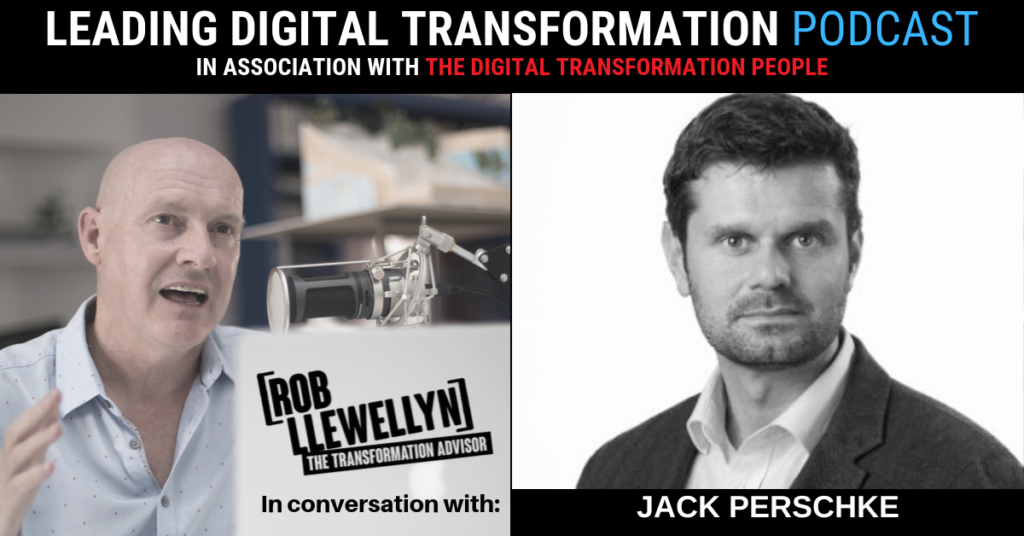Leading Digital Transformation’ is a weekly podcast series in association with The Digital Transformation People and Rob Llewellyn digital transformation advisor and founder of CXO Transform.
During this series, Rob interviews experienced practitioners, authors and thought leaders whose stories and experiences provide valuable insights for digital transformation success.

In this episode, Rob interviews Jack Perschke Head of Government for B&PS the digital services division of Atos Consulting.
Listen here and read the full transcript below.
Transcript:
Rob Llewellyn [00:00:20] Delivering digital transformation in government is particularly hard and extremely important. Today Jack Perschke from London is going to talk to us about some of his experiences and in doing so he’s going to pick out some key dos and don’ts as he goes. So let’s jump into the interview with Jack.
Rob Llewellyn [00:00:44] Jack great to have you on the call.
Jack Perschke [00:00:46] Thank you very much for having me.
Rob Llewellyn [00:00:48] Jack, before we get going and we delve deeper into digital transformation in government just tell us a little bit about your background and what you’ve done in digital government.
Jack Perschke [00:00:59] Okay, so I’ve been working in government public sector technology for about 15 years now and I guess the interesting thing about the perspective I have is that I’ve seen the problem from a variety of different angles. So I spent some time with one of the Big Four as a client-side advisor helping government buy technology solutions. I then went into the policy realm and helped support cabinet-level politicians as they worked out what the policy was going to be for government, spent some time in the Cabinet Office organizing the controls and governance. I went to a government department and delivered a major-, or a component of a major digital transformation. And now I work on the supply side with Atos helping provide the solutions that the governance asking for. So it’s a single problem but like a Rubik’s Cube it has many different sides and you’ve got to be able to see all the different sides to really understand how to get to the solution. And that’s something I’ve been lucky enough to do over the last 15 or so years.
Rob Llewellyn [00:02:15] It’s safe to say you’ve been around the block a little then. Yes.
Jack Perschke [00:02:20] Yes.
Rob Llewellyn [00:02:20] Before we get into some of the challenges Jack, tell us why is having a digital governance so important to a country?
Jack Perschke [00:02:26] So clearly government is the basis on which our societies exist. It is the code which brings us all together and allows us all to contribute to create the country that we want to be. It takes money from us and we may think whatever we think about taxation but ultimately it’s the way in which we share our success with our fellow citizens. It delivers justice to us and keeps us on the straight and narrow and keeps us all safe as well. And ultimately it paves the way for the future of all of us through education and infrastructure and a variety of other things. So government underpins a country, a digital government underpins us in a modern way. And really there are two different shades of digital government. There is the digitization of an existing process and then there is the new thing enabled by digital. So let’s try and do a couple of examples of that. So Road Fund Tax going digital is simply the digitization of a new process. Securing a divorce digitally is an entirely new way of thinking about a process. So you no longer need to be in a courtroom with a judge and you have to rethink the entire role of the state in the process. Now, both of these things are happening across government today. They are in their own ways equally important but they require a breadth of imagination that goes well beyond technology, that goes well into policy and what there is social consent for us to do. So it’s very important and extraordinarily interesting.
Rob Llewellyn [00:04:43] Okay. And Jack I’ve got two questions off the back of what you just said. Firstly I know you’re based in London. Before I go onto international government how is the UK government doing in terms of its digital transformation right now in your view?
Jack Perschke [00:04:59] So it’s a tricky one. We’re doing pretty well in some respects. So-, and I think I would have said five years ago we were doing better. We grasped the nettle early. We understood at a senior political level just how interesting and important this subject was. And we created some infrastructure in the form of the Government Digital Service to support these kinds of digital transformations. Where we went wrong, and some of this is controversial, some of it less so but my view is where we went wrong is we confuse the outcomes with the inputs which will be a theme probably that will come up throughout this conversation. And what I mean by that is my view is the GDS and government and some of the government departments got hung up on on how we do things on the what we put in rather than the outcomes we’re creating. And so what that meant was legacy systems were thrown out too early, or in fact were never thrown out, because there was a view that we’ll just build it from scratch. Where actually an incremental approach would have been better and more efficient. I think existing technology stacks were sidelined because there was the view that that’s how it used to be done and these days we’re all going to build all our own stuff. And I think that accountability in the form of who is actually responsible for delivering these things got lost as well. So the net result was we started well, we grabbed the vision and we understood it. We set up the infrastructure and then in the process of delivery we got sidelined and distracted and the result is we are now certainly in the front pack but we’re not leading the field in the way that I think we had the opportunity to be.
Rob Llewellyn [00:07:08] Okay. That is a good perspective on UK government. Because I mean we’ve got so many international listeners here. Do you feel that governments in different types of geographic regions around the world face different challenges Jack, or are they all facing a similar challenge?
Jack Perschke [00:07:25] You know it’s really interesting. So one of the things I think is so interesting about this subject is the weird and wonderful things that are affecting the rate at which governments can digitize. I’ll give you an example as my favourite example – the UK certainly last year I think it’s the same this year had the highest participation in digital transactions in Europe. So its citizens spend more money online and than anyone else’s citizens as a sort of percentage of their spend. And one of the reasons for that has been hypothesised is the UK’s postcode system – so, long before the Internet was even conceived of, the UK devised a postcode system that made it very easy to identify which street a house was on. And this has allowed us to when we do a digital transaction we can just put in our postcode and it instantly finds our address and it makes that interaction frictionless and seamless makes for delivery is much easier. Now the reason I mention all of that is because clearly the more used your population is to doing digital transactions the more likely they are to respond better, in fact, demand digital governance. And that’s what we see in the UK. And so we have all these different nations starting from different bases. Some nations don’t have great universal postal systems and so they haven’t really embraced digital commerce. Some nations are just big and disparate and spread around so they haven’t really embraced it and therefore the demand for those types of services is much lower. And therefore the degree to which they are used to doing digital activity is much lower and therefore the demand for digital government is much lower and indeed the suspicion of digital government is much higher. So a very complex web of things that affect the progress, but ultimately the thing that most affects the digitisation of-of any country’s government is the degree to which they have senior level political sponsorship for it because as I discussed at the beginning for many of these exercises we are talking about a fundamental transformation not just in how the service is provided but what it is that is being provided.
Rob Llewellyn [00:09:54] When we talk about digital transformation, of course, everybody is in a different situation or involved in different types of initiatives and organisations and industry etc.. Some people are more involved in a private business. Others, of course, are more focussed on government. What is your view of some of the unique challenges about digitizing government – does it have any particular challenges which you wouldn’t necessarily find in private business transformation?
Jack Perschke [00:10:22] Yeah absolutely. So I always talk about the single number. So in any private business transformation in fact in any private business activity there is a single number by which you can measure success. So it might be or your margin, your turnover whatever the number is that you’re targeting that year, but let’s say it would be your profit, profitability. If that number is going up, you’re broadly doing the right thing. And I realize some big companies it’s complex to try and work out exactly where it is you’re affecting that number. But ultimately everyone can unite around a single number they are trying to change in the right direction in the public sector. Let’s take a hospital. What is the single number we’re trying to change is it the cost of running the hospital? Is it the proportion of deaths in the hospital? Is it the patient satisfaction? Is it the staff satisfaction? Is it the health secretary’s chances of becoming the prime minister? Is it-, you know, there are any number of different ways of measuring success and none of them gives you the whole picture. And this, of course, translates well into the way in which we do digital transformation because we are not doing it for a single reason we are never doing it simply to improve profitability. We’re doing it for multiple, interconnected, highly-complex definitions of success. It can make the measurement of success or otherwise of that transformation far more complicated and the other thing of course about government is that you can’t cherry pick. It is a-, they are almost by definition universal services, so it’s very difficult to provide digital services that are equally accessible for everyone. And that is the absolute key. Whereas in the private sector you can say well actually oh let’s just target young people’s bank accounts. Let’s just target student bank accounts for this pilot rollout. For lots of government you can’t do that, you can’t pick and choose your audience you must offer it to the whole of society which makes-, which makes it very you know you have to have a complete solution.
Rob Llewellyn [00:12:53] Jack you’ve touched on success there but what characterizes successful digital transformation in government?
Jack Perschke [00:13:00] Yeah. Really hard. So yes as discussed really hard. In my view, what characterizes success is absolutely nothing to do with technology. You can go a long way-, you go a long way away from the technology. What characterises success is a ‘citizen experience’ that meets their expectations of that government. It’s a government service that is pushing forward the agenda of that government and making the country, the nation, a better place to be. These all sound like quite big high aspirations but that is the reality of government. If you are not positively contributing to society you are not delivering success in a public sector digital transformation.
Rob Llewellyn [00:13:56] What are the classic pitfalls in government that programs tend to fall into right?
Jack Perschke [00:14:02] Right, so I think I think there’s a really well-trodden route to failure that I’ll lay out for you. So the first thing that happens is someone, somewhere in a public sector organisation-, and by the way, I suspect this route to failure is equally applicable to large private sector organisations as well. So it’d be interesting to see what your listeners think. But ultimately the first step is someone realises, someone senior, that digital is a great way forward and it’s going to realise some operational savings. They then think ‘oh crikey’, that means the people who are doing the job today are gonna be put out of work if this is successful. And so they’d be turkeys voting for Christmas. I don’t want them anywhere near this project! All right. And so what I’m going to do is a long way away from the operations guys who are doing the job today. I’m going to stand up a shiny new transformation program full of really well-committed change agents who are nothing to do with today’s business as usual, and so we’re going to have the capability to transform operations digitally but away from the actual operations people. At some point I’m now going to tell the operations guys that I’ve got this new capability and they’re going to think that’s insane because they-, all the inside, all the real knowledge about operations is held by the operational staff and they’re going to point out all the errors and gaps that my new team have in their planning and disregard their views are then having alienated my staff, their unions and my suppliers, and having walked into a variety of very avoidable pitfalls oh give up blaming basically the organization, suppliers, politics or any number of different things. And it is that single fact of not just engaging with the staff that do it today but having them at the front and centre of your digital transformation that breaks most of these programs. And there was an interesting video on LinkedIn the other day about digital transformation. It was one of these inspirational-, innovation “Digital Innovation” things about how you never let the people that do the job today anywhere near your digital vision! That’s what Blockbuster did and that’s why it went bust, kind of thing. And I’m sure there’s some mileage in that in the private sector in certain sections but where you are delivering a service that is mandated often by law where the process is set out by law if you start trying to innovate from a blank sheet of paper you will not succeed in government. You must, mus,t must have your operations staff front and centre of the change that you’re trying to drive.
Rob Llewellyn [00:17:01] I think what you just said Jack will resonate with a lot of people out there public and private sector. But you know in terms of UK government are we getting better at that?
Jack Perschke [00:17:11] No no. My view is government has spent-, so, well since 2010 let’s call it, let’s call the best part of a decade now trying to deliver these things and it never seems to learn that sort of radical incrementalism is always more successful than some big, complicated change program. What you really want to be doing is finding the outcome you want to be different, the measurement you want to be different – customer satisfaction, speed of transaction, costs per transaction, percentage take it up, whatever the thing is and you want to be relentlessly targeting that outcome using all the different tools at your disposal and with your existing operations staff at the front centre of that change. When they stand up these separate programs, they grow arms and legs and the business case grows and people load into these sort of separate change entities. You know, all of last year’s failed programs that no one has to account for those, any wacky idea, a whole load of procurements that no one wants to deliver, and they throw them all into this big change program and it becomes too big to succeed. We hear a lot about “too big to fail” these become “too big to succeed”. And there’s a sort of lifecycle to them – they’re like a snowball rolling down a hill they just get bigger and bigger and bigger and eventually they drop below the snow line and the sun comes out they melt away and no one realizes they’ve come, they’ve been there. And it keeps happening and government isn’t really showing any signs of getting better. I mean the UK government in particular we have a particular problem the last three years the government’s been distracted by obviously Brexit and a variety of other political internal UK political issues and the sort of, the amount of time and energy available to focus on these sort of important but basically administrative issues has dwindled and so-, and so we’re not really learning the lessons of the [speed up].
Rob Llewellyn [00:19:25] So there are plenty of pitfalls and plenty of challenges. As a final question to you Jack, what are some of the golden rules that you can leave for the listener to help them overcome those challenges and those typical pitfalls?
Jack Perschke [00:19:37] I have a list of rules-, I’ll just rattle through them and touch on them – so rule number one is be pragmatic. So the first rule is don’t worry too much about rules. Okay so take all of these rules with it with a pinch of salt but be pragmatic, be flexible. Get yourself-, focus on the outcome not the input. The second rule is what I’ve just been talking about which is value – delivering change from within your business, over creating a separate program. My third rule is value your staff and their continuity – so, change often happens through these transitions, transformations but keep hold of good staff, keep hold of institutional knowledge. Four is add value an accurate business case over an ambitious business case. Those not in the public sector, business cases are the sort of engines that drive all of these programs. It’s the point at which you say ‘this is how much we think we can deliver in benefits. And this is how much we think it’s going to cost’. And the temptation is always to sort of sweeten in that pudding if you like and try and exaggerate essentially benefits you’re going to deliver. And my view is you will want to get it right from that moment on, so you’re realistic from then. And then when you’ve defined your benefits, value-, a detailed benefits analysis over light touch benefits analysis, what I mean by that is real-time understanding week on week, are we delivering the outcomes we thought we were going to deliver where 50 per cent of our way through the project, we’ve spent 50 per cent of our money. What percentage of the benefits have we delivered? If it’s only 1 per cent then I’d question whether you’ve structured your change program appropriately – and that happens all the time. Always going into government transformation programs where they are 50 per cent through the way of the time, 50 per cent of the way through the money and they’ve delivered little or no benefits and they say no no but all the benefit is going to come when we’ve done all of the programs so you have to wait until we’re 100 per cent through, and that to me is a recipe for disaster. Related to that is I would value adaptive budgets and plans, over fixed budgets and plans. So I’m ten per cent of the way through my project, I’ve-, and I’m ten per cent of the way through my money and I’m not delivering any of the benefits right. That’s the point at which we stop. We replan. We reallocate our money and we get there. If I’ve delivered-, over delivered on my benefits because we found this rich seam of benefits somewhere in the program, then let’s adapt the plan and really reinforce that and drive success. Because once you get a delivery culture in a program, it’s very hard to stop it you build momentum and you get going. I would also recommend you value what I call ‘standardized reporting’ over bespoke reporting. In the public sector, everyone wants to know how you’re doing and everyone wants to know it from a slightly different angle. And I’ve certainly been on programs where up to 30/40 percent of the effort is spent on reporting and the only way you can stop that is if you agree in advance a standardised set of reporting with your stakeholders and you say ‘this is it – this is all the reporting we’re going to do, it exists in real time and you access that data, and that’s all you have. You want to cut it in a different way you’re gonna have to do it yourselves!’.
Jack Perschke [00:23:02] And my final golden rule is to value leadership over almost everything else. So even if you break all the rules I’ve just described. If you have the right person in charge with the right vision and the ability to drive the team to the right conclusion you will probably get there. However, even if you fit all- even if you meet all of my rules, do exactly as I described but you’ve got the wrong person in charge you absolutely won’t get it. So, so leadership as with so many things in life is absolutely critical in delivering these digital transformations.
Rob Llewellyn [00:23:38] Jack terrific insights there, I’d love to delve deeper but we’re coming up to our time so we need to wrap it up there. But listen, where can people, if people want to learn more about what you’ve been talking to us about today, where can they go?
Jack Perschke [00:23:52] So, The Digital Transformation People.com have a number of my articles including one titled “Delivering digital transformation in government” which sets out those eight Golden Rules I just described and some other issues. There’s also an article on there about whether transformation programs got too big. And my pet subject, which is the case for the universally accurate information that the digital transformation people dot com and you’ll find me as one of the authors and then I’m more than happy for people to reach out to me on LinkedIn and all the rest of it. My surname is relatively unusual so disadvantages is the spelling can be a bit complex but I guess it would be up in the podcast somewhere. But the advantage is that there’s only one of me! So, so reach out. Find me, I’m really happy to talk to people.
Rob Llewellyn [00:24:39] Jack. Thanks so much for your time today. Everybody, that was Jack Perschke. Jack, it’s been a pleasure speaking with you.
Jack Perschke [00:24:47] Total pleasure. Thank you very, very much.
VO [00:24:49] We hope you enjoyed this episode of “Leading Digital Transformation” with Rob Llewellyn and The Digital Transformation People. Visit www.thedigitaltransformationpeople.com to secure the knowledge, talent and services you need for digital transformation success. To continue your journey as a certified transformation professional, visit www.RobLlewellyn.com. Be sure to subscribe to the podcast and follow us on Twitter @TheDigitalTP and @RobertLlewellyn
Article by channel:
Everything you need to know about Digital Transformation
The best articles, news and events direct to your inbox
Read more articles tagged: Featured, Leadership






